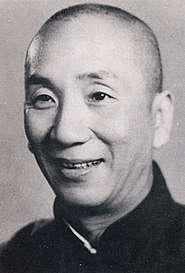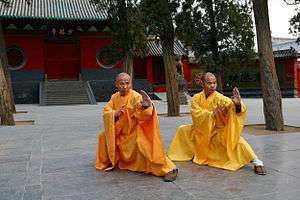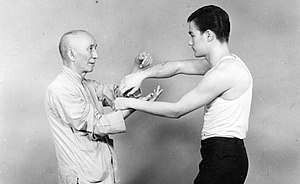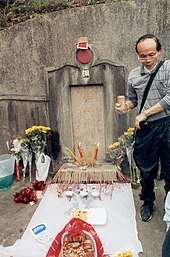Ip Man
Ip Man, also known as Yip Man,[2] (Chinese: 葉問; 1 October 1893 – 2 December 1972) was a Hong Kong martial artist and a grandmaster of the martial art Wing Chun. He had several students who later became martial arts masters in their own right, the most famous among whom was Bruce Lee.
| Ip Man | |||||||||||||||||||||||
|---|---|---|---|---|---|---|---|---|---|---|---|---|---|---|---|---|---|---|---|---|---|---|---|
 Ip Man | |||||||||||||||||||||||
| Born | Ip Kai-man (葉繼問) 1 October 1893 Foshan, Guangdong, China | ||||||||||||||||||||||
| Died | 2 December 1972 (aged 79) Mong Kok, Kowloon, Hong Kong[1] Laryngeal Cancer | ||||||||||||||||||||||
| Native name | 葉問 | ||||||||||||||||||||||
| Other names | Yip Man Yip Kai-man Ye Wen | ||||||||||||||||||||||
| Residence | British Hong Kong | ||||||||||||||||||||||
| Style | Wing Chun | ||||||||||||||||||||||
| Teacher(s) | Chan Wah-shun Ng Chung-sok Leung Bik | ||||||||||||||||||||||
| Rank | Grandmaster | ||||||||||||||||||||||
| Years active | 1917–1972 | ||||||||||||||||||||||
| Occupation | Martial artist | ||||||||||||||||||||||
| Spouse | Shanghai Po (1955–1968) | ||||||||||||||||||||||
| Children | |||||||||||||||||||||||
| Notable relatives | Ip Oi-dor (father) Ng Shui (mother) | ||||||||||||||||||||||
| Notable students | Bruce Lee Leung Sheung Lok Yiu Chu Shong-tin Wong Shun Leung Siu Yuk Men Ip Chun Ip Ching Leung Ting Victor Kan Ng Chan William Cheung Moy Yat Lo Man Kam | ||||||||||||||||||||||
| Notable club(s) | Ving Tsun Athletic Association | ||||||||||||||||||||||
| Chinese name | |||||||||||||||||||||||
| Traditional Chinese | 葉問 | ||||||||||||||||||||||
| Simplified Chinese | 叶问 | ||||||||||||||||||||||
| |||||||||||||||||||||||
| Ip Kai-man | |||||||||||||||||||||||
| Traditional Chinese | 葉繼問 | ||||||||||||||||||||||
| Simplified Chinese | 叶继问 | ||||||||||||||||||||||
| |||||||||||||||||||||||
| Part of a series on |
| Chinese martial arts (Wushu) |
|---|
 |
| Wushu in the world |
|
Historical locations
|
| Wushu athletes/practitioners |
|
Legendary figures
|
|
Historical individuals
|
|
Modern celebrities
|
| Wushu influence |
Early life
Ip Man was born as Ip Kai-man (葉繼問) to Ip Oi-dor (葉靄多) and Ng Shui (吳瑞) as the third of four children. He grew up in a wealthy family in Foshan, Guangdong, and received traditional Chinese education, alongside his elder brother Ip Kai-gak (葉繼格), elder sister Ip Wan-mei (葉允媚) and younger sister Ip Wan-hum (葉允堪).[3]
Ip started learning Wing Chun from Chan Wah-shun when he was 9[4] or 13.[5][6] Chan was 57 at the time, and Ip became Chan's 16th and last student.[7][8] Due to Chan's age, he was only able to train Ip for three years before suffering a mild stroke in 1909 and retiring back to his village. Ip learned most of his skills and techniques from Chan's second most senior student, Ng Chung-sok (吳仲素).[9]
At the age of 16, with help from his relative Leung Fut-ting, Ip moved to Hong Kong and there he attended school at St. Stephen's College, a secondary school for wealthy families and foreigners living in Hong Kong.[3] Six months after moving to Hong Kong, a classmate of Ip's named Lai told him that a friend of Lai's father who was an expert in Kung Fu techniques was living with them, and had offered to have a friendly sparring match with Ip. At the time, Ip was undefeated so he eagerly accepted the challenge. He went to Lai's house on a Sunday afternoon and, after exchanging brief pleasantries, challenged the man to a duel. The man was Leung Bik and he easily overwhelmed Ip Man. Incredulous at the speed with which he had been countered, Ip requested a second duel and was beaten again, just as soundly. Discouraged by his defeat, Ip left without a word and afterward was so depressed that he did not dare mention that he knew Kung Fu. A week later, Lai told him that the man he had fought was asking after him. Ip replied that he was too embarrassed to return, at which point Lai told him that Leung Bik had highly praised his Kung Fu techniques and that he was the son of Leung Jan, who trained Ip's master Chan Wah-shun. Ip proceeded to train with Leung Bik,[10] until Leung's death in 1911.[11]
Ip returned to Foshan in 1917 when he was 24 and became a police officer there.[3] He taught Wing Chun to several of his subordinates, friends and relatives, but did not officially run a martial arts school.
Ip later married Cheung Wing-sing and they had several children; sons Ip Chun and Ip Ching, and daughters Ip Nga-sum (葉雅心) and Ip Nga-wun (葉雅媛).[12]
Some of his best known informal students were Chow Kwong-yue (周光裕), Kwok Fu (郭富), Lun Kah (倫佳), Chan Chi-sun (陳志新), Xu He-Wei (徐和威) and Lui Ying (呂應). Among them, Chow Kwong-yue was said to be the best, but he eventually went into commerce and stopped practicing martial arts. Kwok Fu and Lun Kah went on to teach students of their own and they passed down the art of Wing Chun in the Foshan and Guangdong region. Chan Chi-sun and Lui Ying went to Hong Kong later but neither of them accepted any students.
Ip went to live with Kwok Fu during the Second Sino-Japanese War and only returned to Foshan after the war, where he resumed his career as a police officer. Ip found some time to train his second son Ip Ching during the year 1949. At the end of 1949 after the Chinese Communist Party won the Chinese Civil War, as Ip was an officer for the Kuomintang, Ip, his wife and their elder daughter Ip Nga-sum left Foshan for Hong Kong.[13]
Life in Hong Kong
Ip, his wife Cheung and their daughter arrived in Hong Kong through Macau in 1950. His wife and daughter would later return to Foshan to retrieve their identity cards. However, due to the closure of borders between China and Hong Kong in 1951, Ip and Cheung were separated for good, with the latter remaining in Foshan.
Initially, Ip Man's teaching business was poor in Hong Kong because Ip's students typically stayed for only a couple of months. He moved his school twice: first to Castle Peak Road in Sham Shui Po, and then to Lee Tat Street (利達街) in Yau Ma Tei. By then, some of his students had attained proficiency in Wing Chun and were able to start their own schools. They would go on and spar with other martial artists to compare their skills, and their victories helped to increase Ip's fame.
Around 1955, he had a mistress from Shanghai, who was referred to by his students simply as Shanghai Po (上海婆). Ip and this mistress also had an illegitimate son named Ip Siu-wah (葉少華). Meanwhile in Foshan, his wife Cheung died of cancer in 1960. Ip never formally introduced his mistress to his other sons, who eventually arrived in Hong Kong to reunite with him in 1962.[14]

In 1967, Ip and some of his students established the Ving Tsun (Wing Chun) also pronounced as "Ring Chun" Athletic Association (詠春體育會).[15][16] The main purpose of the Ving Tsun Athletic Association was to help Ip tackle his financial difficulties in Hong Kong,[17] which was said to have caused his supposed regular use of opium.[18] One of his former students, Duncan Leung, claimed that Ip used tuition money to support his opium addiction.[19] Ip's mistress died of cancer in 1968, and their son later became a Wing Chun practitioner like his half-brothers.
Death and legacy

Ip died on 2 December 1972 in his unit at 149 Tung Choi Street in Hong Kong,[1] from laryngeal cancer, only seven months before the death of Bruce Lee, his most famous student.[20] He was buried at Wo Hop Shek, Hong Kong.
Ip's legacy is the global practice of Wing Chun. Ip's notable students include: Leung Sheung, Lok Yiu, Chu Shong-tin, Wong Shun Leung, Siu Yuk Men, Bruce Lee, Moy Yat, Ho Kam Ming, Chow Tze Chuen, Victor Kan, his nephew Lo Man Kam, and closed door student Leung Ting.[10] Ip wrote a history of Wing Chun.[21] Many artefacts of his life are on display in the Ip Man Museum on the Foshan Ancestral Temple grounds. Ip Man is portrayed in many films based on his life.[22]
Martial arts lineage
Wing Chun lineage according to Ip Man.[21][23]
| Ng Mui (one of the Five Elders of Shaolin Monastery) |
| Yim Wing-chun (taught self-defense techniques (later named after the student) by Ng Mui)[24] |
| Leung Bok-chau (Yim's husband) |
| Leung Lan-kwai |
| Wong Wah-bo (was taught the pole form by Leung Yee-tai in exchange for the empty hand system) |
| Leung Yee-tai (added his pole form to the empty hand system he learned from Wong) |
| Leung Jan |
| Chan Wah-shun |
| Yip Man (also learned from Ng Chung-sok, Leung Bik) |
| Known students: See Branches of Wing Chun |
Media portrayals
In the 1976 film Bruce Lee: The Man, The Myth, Ip Man's eldest son Ip Chun portrayed his father in a minor role as Bruce Lee's Wing Chun Sifu.
Ip Man was portrayed by Wang Luoyong in Dragon: The Bruce Lee Story [25] in a 1993 American biographical drama film based on the life of Bruce Lee, who was one of Ip's students.
Yu Chenghui portrayed Ip Man in the 2008 Chinese television series The Legend of Bruce Lee, which was also based on the life of Bruce Lee.
Ip Man, a Hong Kong film based on the life of Ip Man, starring Donnie Yen as the martial artist, was released in cinemas in 2008. The film takes a number of liberties with Ip's life, often for dramatic effect. Ip's eldest son Ip Chun appears in the film and served as a consultant on the production, which focuses on Ip's life during the 1930s to the 1940s during the Second Sino-Japanese War. The film is the first to be based on the life of Ip.
The sequel Ip Man 2 focuses on Ip's beginnings in Hong Kong and his students, including Bruce Lee. Ip Man has taught many other people. Amid a surge of Ip Man–related film projects in production, Donnie Yen told the Chinese media in March 2010 that after Ip Man 2, he would no longer play the Wing Chun master, stating, "I would never ever touch any films related to Ip Man. This will be my final film on the subject. Whenever something becomes a success, everyone would jump on the bandwagon, this is very frightening. Did you know how many Ip Man films are in production? Under such condition, we would not progress, it'd only lead to over-saturation of the subject matter."[26]
Another Hong Kong film based on Ip Man's life, called The Legend Is Born – Ip Man, was released in June 2010. Herman Yau directed the film and it starred Dennis To as Ip Man, and Seventeen band's Wen Junhui as his younger counterpart respectively. Ip Chun makes a special appearance in the film as Leung Bik.
In the 2010 film Bruce Lee, My Brother, Ip Man was portrayed by Wong Chi-wai.
Wong Kar-wai's The Grandmaster is a 2013 film starring Tony Leung as Ip Man. The film concentrates more on the end of an era in Chinese martial arts history as the Second Sino-Japanese War broke out. It was created in an almost biographical style, highlighting parts of history. In contrast with the other Ip Man–related projects, The Grandmaster is a more reflective film, focusing more on the musings and philosophies between martial arts and life, as well as Ip Man's journey through the early 1930s to the early 1950s.
The 2013 Chinese television series Ip Man, based on Ip Man's life, was first aired on the television network Shandong TV from late February to mid March 2013. It was directed by Fan Xiaotian and starred Kevin Cheng as the eponymous character and Zhou Jianan as the younger counterpart.
The 2013 Hong Kong film Ip Man: The Final Fight, directed by Herman Yau and starring Anthony Wong as Ip Man, focuses on Ip's later life in Hong Kong. Kevin Cheng from the 2013 television series Ip Man made a guest appearance as young Ip Man. Ip Chun made a cameo appearance in the film. This film also focuses on the loyalty of Ip Man's students towards their master.
Despite Donnie Yen‘s claims, made earlier in March 2010, that he no longer wanted to be involved in future films related to Ip Man, a new film to the same series, Ip Man 3, was released on 24 December 2015 with Yen once again reprising his role as Ip Man.[27] He also reprised his role as Ip Man in Ip Man 4, which focused on Ip Man coming to San Francisco to find a school for his son as he himself struggles with cancer.[28][29] The film was released on 20 December 2019.
References
- 影武者‧ 葉問次子葉正專訪 [Exclusive Interview with Ip Man's second son Ip Ching] (in Chinese). Ming Pao Weekly Online. Archived from the original on 8 September 2013. Retrieved 18 February 2013.
旺角通菜街一百四十九號一個單位內, ... 傳奇的老者在那個單位的一張沙發上遽然離世。 [Translation: ... in a unit at 149 Tung Choi Street, Mong Kok, ... the legendary old man passed away suddenly on a sofa in that unit.]
- Knight, Dan (20 July 2012). "Ip Man or Yip Man". kwokwingchun.com.
- Title: Yip Man – Portrait of a Kung Fu Master, Page:3, Author(s): Ip Ching and Ron Heimberger, Paperback: 116 pages, Publisher: Cedar Fort (23 January 2001), ISBN 978-1-55517-516-0
- Title: 116 Wing Tsun Dummy Techniques as demonstrated by Grandmaster Yip Man, Page: 100, Author(s): Yip Chun, Publisher: Leung’s Publications (February 1981)
- Title: Wing Tsun Kuen - 19th Edition, Page: 47, Author(s): Leung Ting, Publisher: Leung's Publications (September 2003)
- Knight, Dan (11 July 2012). "Sam kwok Wing Chun – Yip Man Family Tree". Kwokwingchun.com. Retrieved 28 October 2019.
- Knight, Dan (11 July 2012). "Sam kwok Wing Chun – Yip Man Family Tree". Kwokwingchun.com. Retrieved 29 November 2011.
- Mastering Wing Chun, By Samuel Kwok
- "Lives of Chinese Martial Artists (6): Ng Chung So". Kung Fu Tea. Retrieved 11 July 2020.
- "An Interview with Grandmaster Yip Man". www.kwokwingchun.com. 22 January 2014. Retrieved 25 January 2019.
- Ron Heimberger, Ip Ching (2001). Ip Man: Portrait of a Kung Fu Master. Cedar Fort. p. 15. ISBN 9781555175160.
- "Wing Chun Kuen". www.wingchun.si. Archived from the original on 19 January 2019. Retrieved 9 January 2019.
- Knight, Dan (20 July 2012). "Ip Man's Biography". Kwokwingchun.com. Retrieved 2 August 2018.
- The Creation of Wing Chun. United States: SUNY Press. 2015. p. 247. ISBN 9781438456959.
- Ip Ching, Ip Man: Portrait of a Kung Fu Master (Springville, UT: King Dragon Press, 2001)
- Ip Man Wing Chun 50th Anniversary Journal (Hong Kong: Wing Chun Athletic Association Limited, 2005)
- "Origin of Ving Tsun". www.vingtsun.org.hk. Retrieved 2 December 2015.
- Bruce Lee: Fighting Spirit: A Biography, Bruce Thomas, p. 208 "Both Bruce's father and even his wing chun master Yip Man were no strangers to the opium pipe."
- Ing, Ken (16 May 2009). "Asia Times Online :: China News, China Business News, Taiwan". Archived from the original on 2 April 2017.
- Complete Wing Chun: The Definitive Guide to Wing Chun's History and Traditions, Robert Chu, Rene Ritchie, Y. Wu, page 9, Tuttle Publishing; 1st edition (20 June 1998). ISBN 0-8048-3141-6, ISBN 978-0-8048-3141-3.
- "external copy of the History of Wing Chun Written by Yip Man". Vingtsun.com.hk. Retrieved 29 November 2011.
- "Ip Man tong virtual tour". Foshanmuseum.com. Archived from the original on 28 November 2011. Retrieved 29 November 2011.
- Ip Man. "The Origin Of Wing Chun". Martial Arts & Self Defence London. Southfields Wing Chun London. Archived from the original on 24 July 2013. Retrieved 29 November 2011.
- "Wing Chun Academy: Ng Mui". Archived from the original on 1 March 2016. Retrieved 11 July 2020.
- "Ip Man (Character)". IMDb. Archived from the original on 25 December 2016. Retrieved 4 February 2011.
TV episode, Played by Cheng-Hui Yu (as Ye Wen)
- "Donnie Yen Has Had Enough of Ip Man - Wu-Jing.org". Guangzhou Daily. 8 March 2010. Archived from the original on 11 March 2010. Retrieved 4 February 2011.
- "Ip Man 3 (Hong Kong, 2015)". VCinema. 9 January 2016. Retrieved 14 March 2018.
- Raymond, Nicholas (7 May 2018). "Ip Man 4 Casts Scott Adkins". ScreenRant. Retrieved 5 March 2019.
- "IP Man 4 Teaser Trailer Pits Donnie Yen Against Scott Adkins". Movies. Retrieved 20 March 2019.
| Wikimedia Commons has media related to Yip Man. |